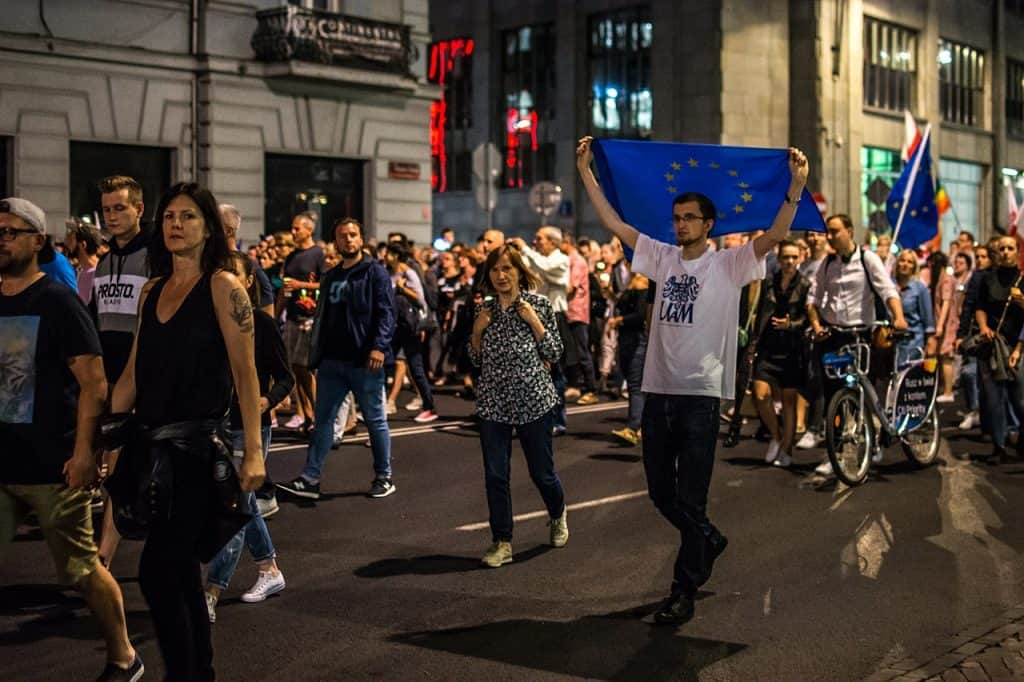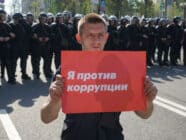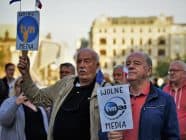
A protest in Poland on July 21, 2017 over proposed judicial reforms. Source: Staboslaw/flickr – CC BY 2.0
Poland’s media is becoming highly divided, polarised and tribal. New research, based on interviews with leading journalists, has found objectivity is being replaced by an emerging “journalism of identity” – ideologically engaged narratives that help build a community of like-minded audiences – developed and introduced by the country’s right-wing media.
The changes reflect the recent transformation of the Poland’s media landscape, accelerated by the 2015 parliamentary victory of the conservative, populist Law and Justice party (PiS). Over the last two years the PiS government has taken control of state broadcasters and promised a shift from public to “national” media. In a recent move, Poland’s media regulator, the National Broadcasting Council, last week fined the US-owned private television broadcaster, TVN24, PLN 1.48 million (approx EUR 350,000) over its coverage of protests outside parliament in 2016. TVN24 was accused of “promoting unlawful activities and encouraging behaviour that threatens security”.
The Rise of Poland’s Right-Wing Press
My paper, Is there a chance for non-partisan media in Poland? argues that Poland’s media landscape began to change after the Smolensk plane crash in 2010 which killed Lech Kaczyński, then the country’s president. Kaczyński was also the twin brother of Jarosław Kaczyński, current leader of the PiS party.
Based on interviews with six leading Polish journalists – three from liberal media outlets, (Gazeta Wyborcza, Polityka Weekly and Onet.pl), and three from conservative outlets, (Wnet Radio, Sieci Weekly and Belsat TV) – the report describes how the right-wing press – politically insignificant between 1989, after the collapse of communism, and 2010 – became highly visible and partisan after the 2010 Smolensk crash. The change was partly driven by the internet, which removed barriers to the media market, thus encouraging an economy driven by social media, speed and simplification. Since then, partisanship and political bias have become sought-after commodities.
In this new media order, the Smolensk crash proved a potent catalyst for the resurrection of the old pre-1989 divisions that still run deeply through Polish society. Since 2015, the Law and Justice party’s moves to reshape the country’s media system, alongside its broader change to the judiciary and the way civil society functions have brought widespread international criticism.
The state media, now largely controlled by the government, have swung their coverage to the right, and its message is now largely (and unsurprisingly) pro-government. In the polarised and politicised world of Polish media, those who stand on the right of the political spectrum see this as a positive change, enhancing pluralism and giving a voice to the underrepresented sections of the conservative Polish society. However those on the left see it as an attack on free media and democracy.
What Do Polish Journalists Think About Poland’s Media Landscape
All of the journalists interviewed share a belief that there should be a greater distance between politics and journalism in Poland. But in a country where there have historically been blurred lines between the two professions, there is no immediate or foreseeable end to the political and journalistic crisis.
Objectivity – however desired – no longer appears to be an end goal for Polish journalists, instead advocacy and political engagement continue to dominate the country’s media landscape.
The report, is there a chance for non-partisan media in Poland is available here.
Journalists interviewed for this paper were:
Adam Michnik, editor-in-chief of Gazeta Wyborcza
Bartosz Węglarczyk, Programming Director for Onet.pl
Adam Szostkiewicz – columnist at Polityka weekly
Krzysztof Skowroński – editor-in-chief of Wnet Radio and head of the Polish Journalists Association
Jacek Karnowski – editor-in-chief of Sieci weekly
Agnieszka Romaszewska-Guzy – editor-in-chief of Belsat TV.
Tags: Censorship, conservative, Journalism, Law and Justice Party, media, Media and democracy, objectivity, Poland, populism, Press freedom, right-wing, right-wing media












































